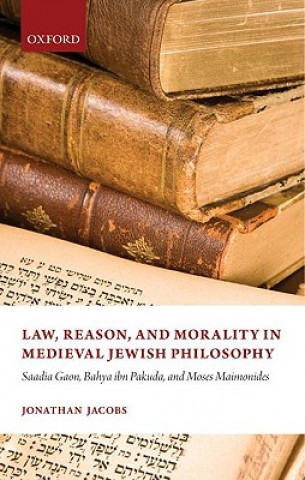
Doručení
Nákupní rádce





Nehodí se? Vůbec nevadí! U nás můžete do 30 dní vrátit
 Dárkový poukaz
V libovolné hodnotě
Dárkový poukaz
V libovolné hodnotě
S dárkovým poukazem nešlápnete vedle. Obdarovaný si za dárkový poukaz může vybrat cokoliv z naší nabídky.
Law, Reason, and Morality in Medieval Jewish Philosophy
 Angličtina
Angličtina
 410 b
410 b
30 dní na vrácení zboží
Mohlo by vás také zajímat


The medieval Jewish philosophers Saadia Gaon, Bahya ibn Pakuda, and Moses Maimonides made significant contributions to moral philosophy in ways that remain relevant today. Jonathan Jacobs explicates shared, general features of the thought of these thinkers and also highlights their distinctive contributions to understanding moral thought and moral life. The rationalism of these thinkers is a key to their views. They argued that seeking rational understanding of Torah>'s commandments and the created order is crucial to fulfilling the covenant with God, and that intellectual activity and ethical activity form a spiral of mutual reinforcement. In their view, rational comprehension and ethical action jointly constitute a life of holiness. Their insights are important in their own right and are also relevant to enduring issues in moral epistemology and moral psychology, resonating even in the contemporary context. The central concerns of this study include (i) the relations between revelation and rational justification, (ii) the roles of intellectual virtue and ethical virtue in human perfection, (iii) the implications of theistic commitments for topics such as freedom of the will, the acquisition of virtues and vices, repentance, humility, and forgiveness, (iv) contrasts between medieval Jewish moral thought and the practical wisdom approach to moral philosophy and the natural law approach to it, and (v) the universality and objectivity of moral elements of Torah.
Informace o knize
 Angličtina
Angličtina
Kategorie




 Jak nakupovat
Jak nakupovat


























